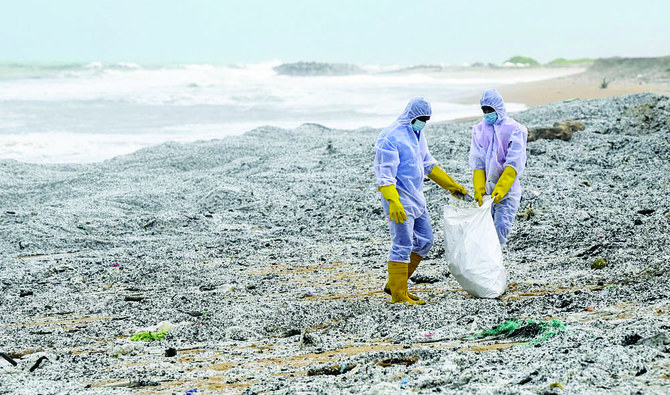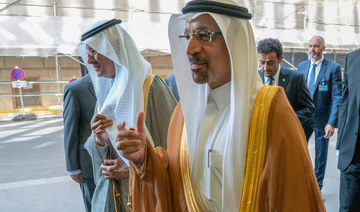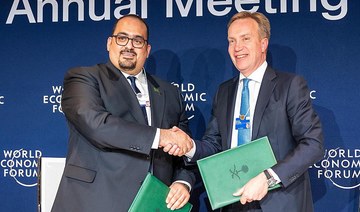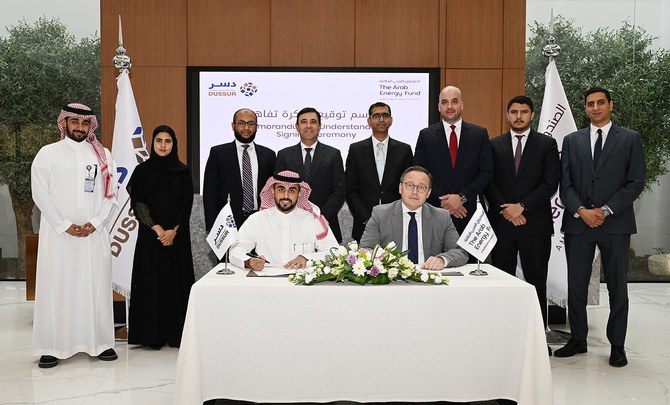DUBAI: For many companies, sustainability is a corporate social responsibility initiative on the fringes; for Oceans and Us, a Dubai-based startup initiated by serial entrepreneur Joel Michael, it is the core area of focus.
But the future health of our planet is not the only forward-thinking aspect of this green startup. Oceans and Us is planning to raise funds by selling 10,000 generative non-fungible tokens and launching a new cryptocurrency.
NFT is a digital asset representing internet collectibles like art, music and games and has an authentic certificate created by blockchain technology that underlies cryptocurrency.
Partnering with NFT artist Vesa Kivinen, also popularly known as VESA in crypto art circles, Oceans and Us plans to raise $1.2 million in funding to clean up oceans worldwide.
FASTFACT
Partnering with NFT artist Vesa Kivinen, also popularly known as VESA in crypto art circles, Oceans and Us plans to raise $1.2 million in funding to clean up oceans worldwide.
VESA is an established digital artist who has built up a track record and a following over the last decade.
“He is a very passionate artist in the climate change space and does a lot of work with marine corals, and the idea for this (partnership) is to essentially bring together the community and bring art as a means of communication,” explained Joel Michael, the founder of Oceans and Us, in an exclusive interview with Arab News.

Joel Michael, founder of Oceans and Us
“Buying an NFT enables people to invest and participate in a hands-on way.”
Sustainability
The idea is to allow those who purchase an NFT to enjoy the added benefits. Oceans and Us plans to partner with 100 brands across the UAE and the Middle East with a sustainable product or solution. Whoever buys or owns an NFT would have discounts or benefits with these companies.
“Sustainability is an ecosystem, and NFTs work as a gateway,” said Michael. “The idea is for all of this to sit on the blockchain that is transparent so every single dollar invested can be seen clearly where it goes.”
Oceans and Us has progressed in talks with the team behind the Qatar World Cup. It is also in advanced talks on a partnership with top UAE-based retailer Landmark Group, particularly by aligning with a sustainable clothing effort on behalf of its leading fashion brand, Splash.
The startup is also associating with coffee brands that already have an eye toward green practices, from coffee cups to procurement of beans to offer NFT owners discounts. He is also speaking to solar home solutions companies and sustainable fashion brands.
In addition, the green startup plans to launch its token as a way to raise funds by crowdsourcing. The aim is to raise awareness and funds to build a boat that cleans the oceans.
The startup is working closely with Marakeb Technologies to design an autonomous, self-driven boat powered by AI that will clear plastic from rivers and oceans.
Marakeb Technologies is incorporated in Sharjah and is 30 percent owned by the Abu Dhabi government. The boat’s inaugural journey is scheduled in July 2022.
“Marakeb has a skillset to produce boats for the government that can put out fires in UAE waters if that happens. We are working with them to design a fully autonomous boat that can do what it needs with no human on it, so no lives are risked on a boat,” said Michael.
“We want to encourage people to help us come up with different solutions including a way we can run the entire operation using wind, solar or kinetic energy. The biggest thing we want to solve is transporting plastic we collect back to land so it can be repurposed.”
Fresh off the boat
The next goal of this initiative is to raise funds for a cash prize as part of the Global Innovation Challenge, an eight-month program that includes events, workshops, and collaborations with incubators and universities to submit designs for a boat.
The competition begins in August 2022, and winners will be announced after 60 days. The aim is to officially launch the boat in time for COP 28 in 2023 in Dubai.
“The Middle East is driving so much in the climate change space, and we are seeing a positive impact in the strongest ways,” said Michael, who has worked in the sustainability space for over a decade. “In the past decade, Europe was the leader, but now everything is aligned with the Middle East.”
Sustainability is high on the agenda across the Gulf region. Late last year, Saudi Crown Prince Mohammed bin Salman launched the Middle East Green Initiative to raise $10.4 billion for an investment fund and clean energy projects to reduce carbon emissions.
Michael added the positive impact of COP 27 hosted in Egypt, followed by COP 28 planned soon in Dubai.
“Because the government supports these initiatives, we are seeing things come together in private markets,” he said. “We have seen tremendous support from the UAE and think it’s the epicenter of sustainability in the region.”
Michael is the regional head of The Green Tech Alliance, a group of 350 CEOs committed to greener practices. The entrepreneur has spent the last 10 years working in the startup and venture capital space, focusing on sustainability.
“No one company can make a change. We are not looking to compete with ocean cleanup companies or be a market leader. Our messaging from innovation challenge to the token is to help organize investments and donations into the right places. We look at ourselves as nothing more than a network orchestrator,” he said.
With a team of 10 working remotely worldwide, Oceans and Us is hard at work to design the autonomous boat in time for its maiden voyage this summer.





















